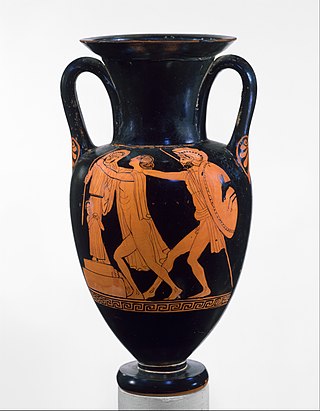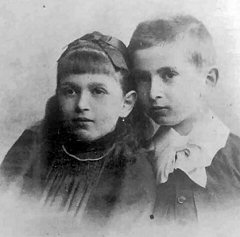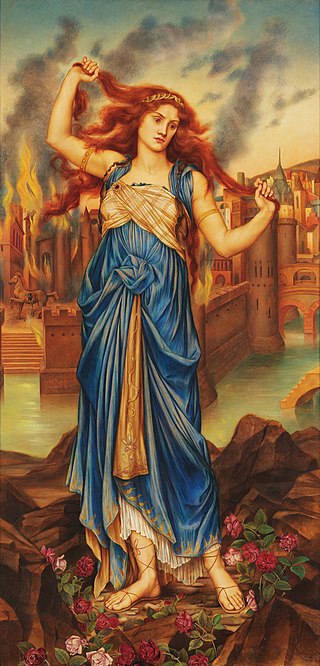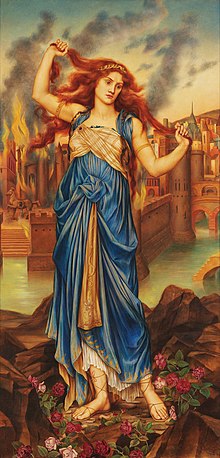
Apollo is one of the Olympian deities in classical Greek and Roman religion and Greek and Roman mythology. Apollo has been recognized as a god of archery, music and dance, truth and prophecy, healing and diseases, the Sun and light, poetry, and more. One of the most important and complex of the Greek gods, he is the son of Zeus and Leto, and the twin brother of Artemis, goddess of the hunt. He is considered to be the most beautiful god and is represented as the ideal of the kouros. Apollo is known in Greek-influenced Etruscan mythology as Apulu.

Cassandra or Kassandra in Greek mythology was a Trojan priestess dedicated to the god Apollo and fated by him to utter true prophecies but never to be believed. In modern usage her name is employed as a rhetorical device to indicate a person whose accurate prophecies, generally of impending disaster, are not believed.

Theism is broadly defined as the belief in the existence of at least one deity. In common parlance, or when contrasted with deism, the term often describes the philosophical conception of God that is found in classical theism—or conception found in monotheism—or gods found in polytheistic religions—or a belief in God or gods without the rejection of revelation as is characteristic of deism.
The Beautifull Cassandra [sic] is a short novel from Jane Austen's juvenilia. It is a parody of the melodramatic, sentimental and picaresque novels of the time, and tells the story of a young woman who sets off into the world to make her fortune.

The Goddess movement is a revivalistic Neopagan religious movement which includes spiritual beliefs and practices that emerged predominantly in the Western world during the 1970s. The movement grew as a reaction both against Abrahamic religions, which exclusively have gods with whom are referred by masculine grammatical articles and pronouns, and secularism. It revolves around Goddess worship and the veneration for the divine feminine, and may include a focus on women or on one or more understandings of gender or femininity.
In some schools of popular psychology and analytical psychology, the inner child is an individual's childlike aspect. It includes what a person learned as a child before puberty. The inner child is often conceived as a semi-independent subpersonality subordinate to the waking conscious mind. The term has therapeutic applications in counseling and health settings. The concept became known to a broader audience through books by John Bradshaw and others.
The anima and animus are a syzygy of dualistic, Jungian archetypes among the array of other animistic parts within the Self in Jungian psychology, described in analytical psychology and archetypal psychology, under the umbrella of transpersonal psychology. The Jungian parts of the Self are a priori part of the infinite set of archetypes within the collective unconscious. Modern Jungian clinical theory under the analytical/archetypal-psych framework considers a syzygy-without-its-partner to be like yin without yang: countertransference reveals that logos and/or eros are in need of repair through a psychopomp, mediating the identified patient's Self; this theoretical model is similar to positive psychology's understanding of a well-tuned personality through something like a Goldilocks principle.

Dora is the pseudonym given by Sigmund Freud to a patient whom he diagnosed with hysteria, and treated for about eleven weeks in 1900. Her most manifest hysterical symptom was aphonia, or loss of voice. The patient's real name was Ida Bauer (1882–1945); her brother Otto Bauer was a leading member of the Austro-Marxist movement.

Clytemnestra, in Greek mythology, was the wife of Agamemnon, king of Mycenae, and the half-sister of Helen of Troy. In Aeschylus' Oresteia, she murders Agamemnon – said by Euripides to be her second husband – and the Trojan princess Cassandra, whom Agamemnon had taken as a war prize following the sack of Troy; however, in Homer's Odyssey, her role in Agamemnon's death is unclear and her character is significantly more subdued.

Hercules is a fictional Olympian god in the DC Universe based on the Greek demigod and hero of the same name.
The idea of polytheistic myth as having psychological value is one theorem of archetypal psychology as defined by James Hillman, and explored in current Jungian mythology literature. According to proponents of this theory, polytheistic myths can provide psychological insight.
Father complex in psychology is a complex—a group of unconscious associations, or strong unconscious impulses—which specifically pertains to the image or archetype of the father. These impulses may be either positive or negative.

Esoteric Nazism, also known as Esoteric Fascism or Esoteric Hitlerism, refers to a range of mystical interpretations and adaptations of Nazism. After the Second World War, esoteric interpretations of the Third Reich were adapted into new religious movements of white nationalism and neo-Nazism. Theories suggest that high ranking Nazis believed in the use of Qabalah magic. They included beliefs in finding a mythical Hyperborea.

Cassandra is a 1983 novel by the German author Christa Wolf. It has since been translated into a number of languages.
The Apollo archetype personifies the aspect of the personality that wants clear definitions, is drawn to master a skill, values order and harmony. The Apollo archetype favors thinking over feeling, distance over closeness, objective assessment over subjective intuition.
Jean Shinoda Bolen is an American psychiatrist, Jungian analyst and author. She is of Japanese descent. A Distinguished Life Fellow of the American Psychiatric Association and a Diplomate of the American Board of Psychiatry and Neurology, she is an emeritus clinical professor of psychiatry at Langley Porter Psychiatric Institute, UCSF Medical Center and member of the C.G. Jung Institute of San Francisco. She is the author of thirteen books in over one hundred foreign editions. She was an NGO delegate to the United Nations Commission on the Status of Women (2002-2018).

Vision in White is the first book of the Bride Quartet series of romance novels, written by Nora Roberts. It spent two weeks atop the New York Times Bestseller List and reached number 3 on the USA Today bestseller list, marking the first time one of Roberts' books had become a bestseller in trade paperback format. A downloadable casual-play computer game based on the book was introduced by I-Play in 2010.

The Firebrand is a 1987 historical fantasy novel by American author Marion Zimmer Bradley. Set in the ancient city of Troy, the novel is a re-telling of Homer's epic poem, the Iliad. The Firebrand is written from the point of view of Kassandra, the prophet daughter of King Priam of Troy, and also features other prominent characters from Greek mythology. As in the Iliad, Kassandra foresees catastrophe for her city but few pay heed to her warnings. In Bradley's story, Kassandra is presented as a strong and insightful woman, rather than as a sufferer of insanity.
"Poetry and the Gods" is a short story by H. P. Lovecraft and Anna Helen Crofts. The two authors wrote the story in or shortly before the summer of 1920. It was published the following September in United Amateur, which credits Lovecraft as Henry Paget-Lowe. In the story, a young woman dreams that she has an audience with Zeus, who explains to her that the gods have been asleep and dreaming, but they have chosen a poet who will herald their awakening.

Lore Olympus is a romance webcomic created by New Zealand artist Rachel Smythe. The comic is a modern retelling of the relationship between the Greek goddess and god Persephone and Hades. It began publishing weekly on the platform Webtoon in March 2018. Lore Olympus is currently the most popular comic on Webtoon; as of March 2024, it has 1.4 billion views and 6.5 million subscribers. The comic has won two Eisner Awards, two Harvey Awards, and two Ringo Awards. It was announced in 2019 that a television adaptation was under development.











